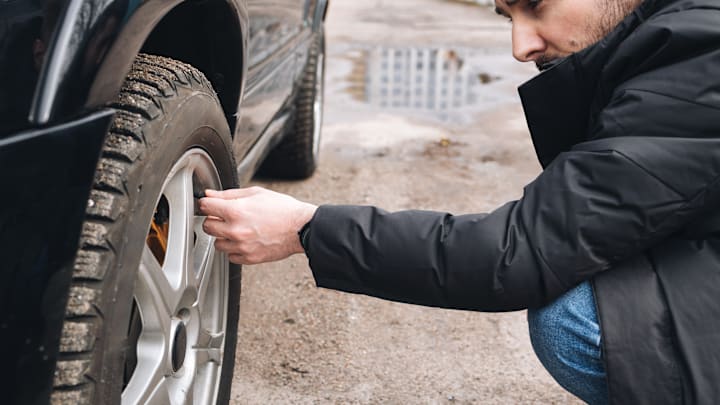Homes, cars, and groceries may be vastly more expensive than they were just a few years ago, but air remains our best free and abundant resource. (Unless you’re in space or underwater, naturally.) Yet thousands of gas stations around the country have found a way to monetize it, charging customers anywhere from 25 cents to several dollars to use a compressed air machine to inflate their tires.
Can they really charge for air? In most cases, yes. In others, they might be breaking the law.
Under Pressure
Most gas stations feature a kiosk near the pumps with a compressed air nozzle that can inflate tires that have fallen below the pounds per square inch (PSI) threshold recommended by automobile manufacturers. (That number can often be found on a label located inside the car’s door jamb.) Dropping a few quarters in the machine kicks on the compressor and gives customers a few minutes to fill up.
The value of this service is somewhat subjective. While air is free, the delivery method to get it pumped into your tires could be construed as something worth paying for. And there is cost associated with running a compressor, which requires electricity.
But many gas station owners cite a different reason for putting a premium on their air: They’re trying to avoid people making use of the business’s resources without paying for gas or other products.
“We aren't making a huge profit from it,” one gas station proprietor told The Press Democrat back in 2013. “But we don't want people just taking the air … all the time without buying gas.”
When full-service gas stations were standard in the earlier part of the 20th century, checking tire pressure was usually part of the attendant’s routine. The freebie become less common as self-service stations grew, and by the 1970s, the practice of charging for air was widespread enough for the National Highway Traffic Safety Administration to voice its concern. Forcing people to pay for tire inflation, it argued, might discourage them from maintaining their tire pressure, which might lead to accidents.
Depending on your location, you might not need to pay for air. But service stations may be keeping that a secret from you.

Gasping for Air
In 1999, California passed a law mandating gas stations offer free air as well as free water to customers—provided they’re also purchasing gasoline. But the law didn’t get a substantial amount of attention, and gas stations continued charging for air. Some resorted to putting up signs notifying customers of their rights, though the font could be hard to read. It may take a customer asking for free air in order to get it. (The compressors often have a bypass located either on the machine or inside the station that can activate it without inserting quarters.)
Connecticut has a similar law, though the state doesn’t mandate fuel purchase. Other states may or may not offer consumers any protection when it comes to getting charged for air.
Sometimes, getting free air is less about your state and more about which business you frequent. Chains like Discount Tire and Firestone offer free air pressure checks and air at no charge; convenience store chains like Wawa and Sheetz make it a policy to offer free air regardless of location.
You can also use a locator like FreeAirPump.com to find complimentary air nearby. If you’d prefer not to be at the mercy of public pumps—which can sometimes be poorly maintained—you can opt to keep a portable compressor in your trunk.
Read More About Travel:
